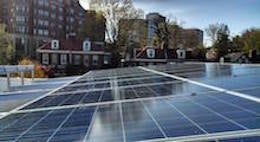Grid reform in D.C.
What is grid reform?
The way we produce and deliver electricity is changing. Distributed solar energy and other renewables are pushing changes to our electrical grids and the rules that manage them.
Grid reform in D.C.
Our Public Service Commission is currently reviewing a proceeding, FC 113o or Modernizing Energy Delivery System for Increased Sustainability (MEDSIS), that explores how to improve our electric grid. This is an important step forward because it gives us the opportunity to build an energy system that creates wealth and benefits for low-income citizens in the District.
We are advocating that the Public Service Commission (PSC) should ensure that all District residents have:
 Energy democracy, which gives communities greater control over their energy resources. With energy democracy, citizens have a say in how their energy system operates. Low-income communities can participate in and benefit from efforts to expand access to sustainable energy resources. Energy democracy also creates new opportunities to own clean energy resources and create wealth.
Energy democracy, which gives communities greater control over their energy resources. With energy democracy, citizens have a say in how their energy system operates. Low-income communities can participate in and benefit from efforts to expand access to sustainable energy resources. Energy democracy also creates new opportunities to own clean energy resources and create wealth.- Advanced technologies, which empower communities to dynamically manage their energy usage, creating greater savings and pathways towards financial stability.
- Strong local economies, which result from community control over energy resources and expanded economic opportunities for low-income communities in D.C. Research shows that increased community control over energy resources leads to marginalized communities owning a larger share of our energy system.
Creating a grid of the future that benefits everyone
There are a lot of different ways we can build an electric grid that benefits everyone in the District. These include:
- Support a plan to put the District on a pathway towards net zero energy use, where the city creates as much energy as it uses.
- Mandate that the energy burden of all District residents not exceed 10% of their annual income.
- Stimulate and promote a “sharing economy” and energy democracy so that locally-owned renewable energy and micro-grids flourish. This will distribute wealth and benefits within the city and integrate with the current grid system.
- Optimize renewable energy goals while also increasing reliability and reducing costs to ratepayers.
Take action
Tell the Public Service Commission we need grid reformThe D.C. Public Service Commission is exploring how to reform D.C.’s electric grid. They’re soliciting comments from District residents. |
Keep up-to-date on what’s happening with D.C.’s grid reformWe publish periodic updates on what’s happening with D.C.’s grid reform in our newsletter. Sign up today to stay informed about solar in the District. |
D.C. resources
We will continue to track these proceedings. Below you will find documents we’ve submitted thus far in response to the PSC’s request for comment.
- In November 2017, eight members of the D.C. Council wrote a letter to the PSC expressing concerns about the lack of progress in the MEDSIS proceeding, urging the Commission to move forward with a stakeholder planning process as soon as possible.
- Our comments on proceeding FC 1130 were filed in March 2017 in response to the public town hall meeting. In the comments, we urged the PSC to adopt a specific set of energy democracy principles to guide the proceeding, and to adopt a strategic definition of “grid modernization” prior to soliciting public feedback on potential pilot programs.
- The Department of Energy and Environment filed initial comments on the scope of proceeding FC 1130 in August 2015. The comments support the proceeding’s efforts to bring together D.C. stakeholders to develop a plan for grid modernization, specifically with regards to fostering “fostering robust deployment of distributed energy resources.”
- The Grid 2.0 Working Group filed initial comments on proceeding FC 1130 in August 2015, supporting the PSC’s grid modernization goals. Their comments highlight the need for the PSC to articulate policy and infrastructure outcomes from the proceeding and the need for deeper public participation in the proceeding.
- Pepco submitted initial comments on proceeding FC 1130 in August 2015, requesting the objectives of the proceeding include how it can integrate new distributed energy technologies into its distribution grid without eroding electricity reliability.
Our work on grid reform in D.C.
June 2015: The D.C. Public Service Commission opened FC 1130 to identify technologies and policies that can modernize our energy delivery system for increased sustainability and will make our system more reliable, efficient, cost-effective and interactive.
